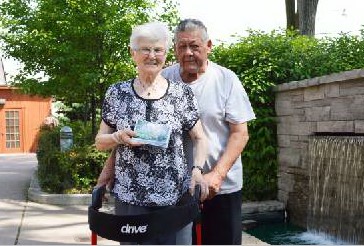A dangerous fall resulting in a fractured knee caused 81-year-old Blanka Prasnjak to lose her independence. Fortunately, Runnymede Healthcare Centre’s new Active Rehab program was able to help her return home and resume her active lifestyle.
Launched in February 2019, the program offers intensive, short-term rehabilitation. “Our clinical team works seven days a week to restore mobility in patients who are recovering from an injury, illness or surgery,” says Runnymede’s Vice President, Clinical Operations & Quality, Chief Nursing Executive & Chief Privacy Officer, Raj Sewda. “By increasing strength and ability, Active Rehab provides patients with the skills they need to adapt to their new reality and return home or move on to their next healthcare destination.”
In May 2019, Blanka slipped and fell down the staircase to her basement. Alone, unable to stand and in extreme pain, she managed to pull herself up the stairs and call out for help. Fortunately a neighbor heard her through an open window and came to her aid so she could be transported to an acute care hospital to treat the fracture in her right knee.
After five days in acute care, Blanka’s mobility was very limited – she was only able to move from her bed to a seat with support from two people. It wasn’t possible to safely return home, so she was transferred to the Active Rehab program at Runnymede for treatment.
According to Runnymede physiotherapist, Christine Wrong, Blanka was not a typical Active Rehab patient. “Compared to most of the patients we admit to the program, her fracture was more complex,” she said. “We were concerned Blanka might not be able to tolerate therapy twice per day, so our team kept a very close watch on her progress.”
The interprofessional team worked with Blanka to overcome her anxiety and manage the pain she was experiencing. Although optimistic in the early stages of her treatment, she was concerned about her future.
However, the twice-daily rehabilitation soon started paying off. “Had we only provided her with therapy once a day, her progress would have been much slower,” Wrong said. “With the more intense therapy, though, Blanka’s recovery was fast, which really helped her see the progress she was making, and motivated her through her treatment.”
As Blanka’s strength grew, the pain decreased and soon she could stand on her own with the aid of a walker. “The exercises they gave me helped a lot,” she said. With the interprofessional team’s support, Blanka was able to achieve her goal of safely using the stairs and understand how she could go about her daily routines when she got back home. “They showed me how to cook in a kitchen with my walker and stay safe,” she said.
After a 21-day stay at Runnymede, Blanka was ready for discharge and excited to return home. Before leaving the hospital, the interprofessional team ensured she and her husband Jim were provided with all of the information and resources they needed. In addition to teaching her simple exercises to do at home, she was provided with resources to access physiotherapy in the community as an outpatient.
On the day of discharge when asked what she was looking forward to most, Blanka’s eyes lit up and she pulled out a nearby photo album of the garden at her Mississauga home and talked excitedly about tending to her garden again. “When I first had my injury, I felt so helpless,” she says. “But everyone here has been so good – the therapists, the nurses, everybody – and bit by bit I was able to get better.”























